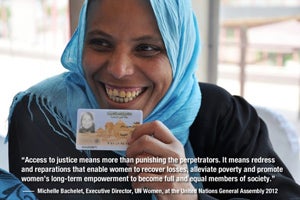Expanding women’s participation in peace-building and recovery is critical to addressing gender-based violations in times of conflict and to advance equality
Date:
UN Women Executive Director, Michelle Bachelet remarks at the High Level Side Event on “Preventing Sexual and Gender-Based Crimes in Conflict and Securing Justice for Survivors. New York, 25 September 2012.
[Check against delivery]
Today, sexual violence in conflict is widespread and widely condemned. Some cases have been prosecuted. But the fact remains that women's bodies remain a battleground, and impunity remains the norm rather than the exception.
I thank everyone in the audience, distinguished panelists and co-hosts, the United Kingdom Mission to the United Nations, the International Campaign to Stop Rape and Gender Violence in Conflict, and the Office of the Special Representative of the Secretary-General on Sexual Violence in Conflict. Thank you for being here, and for taking a stand to prevent sexual and gender- based crimes in conflict and to secure justice for survivors.
I welcome Ms. Bangura as the new Special Representative of the Secretary-General on sexual violence in conflict and pledge the continued cooperation of UN Women.
We applaud the International Campaign to Stop Rape and Gender Violence in Conflict for leading a global civil society campaign on sexual violence in conflict. Thank you for being a unifying force of NGOs from around the world.

I congratulate Mr. Hague for the UK's commitment to establish a team of experts on sexual violence. Together with the UN's own efforts, we can make great strides to identify more cases and achieve justice.
Before I introduce our distinguished guests, I would like to make a few points about the topic of today's event and how UN Women is working to address gender-based violations in times of conflict.
The experience of women during and after conflict continues to be one of violence and insecurity.
As I see it, there are three areas where we can and must take urgent action.
First, it is crucial that we do not lose sight of the broader range of gender-based crimes that women are forced to endure.
In conflict zones, women are disproportionately affected by sexual and gender-based violence, forced displacement, the destruction of civilian infrastructure and rights violations. And the legacy of this violence endures long after a peace agreement is signed.
Access to justice means more than punishing the perpetrators. It means redress and reparations that enable women to recover losses, alleviate poverty and promote women's long-term empowerment to become full and equal members of society.
This means expanding women's participation in peace-building and recovery. Post-conflict engagement provides an opportunity for women to ensure that peace agreements, new laws and new constitutions do not reinforce the preexisting status quo and that they advance equality and justice.
Second, we must address gender inequalities that women experience that make them more vulnerable to sexual and gender-based crimes during and after conflicts.
For these efforts, we must support women's organizations to advance women's rights, women's political and economic empowerment, and transformative justice.
Third, we must pool our efforts as an international community, as national governments, as civil society and as individual actors. UN Women is proud to be a part of UN Action Against Sexual Violence in Conflict to prevent, address and secure accountability for conflict-related sexual and gender-based crimes.
UN Women has been working closely with the Department of Peacekeeping Operations on the first ever scenario-based training for military peacekeepers in prevention and response. We are currently testing this training in major troop contributing countries.
Earlier this month, a first training took place in The Hague on investigating cases of sexual and gender-based violence as international crimes. The initiative, a collaboration of UN Women, Justice Rapid Response, and the Institute for International Criminal Investigations, will create the first dedicated roster of rapidly deployable experts to support the investigation and prosecution of these crimes, whether through international or national processes.
To summarize, we need to increase the role of women in peace and security, improve reparative justice, and cooperate at all levels to see that this justice is served.
Today we are honoured by the presence of three Nobel Peace Laureates, two of whom will address us as co-chairs of the International Campaign to Stop Rape and Gender Violence in Conflict. Both Jody Williams and Leymah Gbowee are examples of the triumph of courage and activism against all odds, from adopting a global ban of landmines to organizing grassroots women to stopping a long civil war.
They are joined in this panel by General Patrick Cammaert, who has led many UN missions and is a tireless advocate for women and their right to live free of violence and discrimination.
I thank you for your participation and I commend you for your work for gender equality, justice and the prevention of all forms of sexual violence.
And now I would like to hand the floor to Jody Williams.
Thank you.